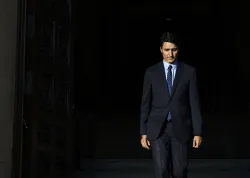Canada: Justin Trudeau govt likely to survive no-confidence motion | Here's how
Although polls indicate the Liberals will lose badly to the official opposition right-of-centre Conservatives in the next election amid unhappiness over inflation and a housing crisis, Trudeau and his closest aides say he is going nowhere and has time to help the party recover.

Toronto: Doubts about the leadership of Canadian Prime Minister Justin Trudeau intensified after his ruling Liberal Party suffered a second humiliating loss in a special election, but the unpopular leader is determined to cling to office ahead of a looming national vote. The Liberals, who have governed for almost nine years, suffered a narrow defeat on Monday in a Montreal constituency that had been one of the party's safest seats.
The loss, following a defeat in Toronto in late June, reinforced the perception that Liberal prospects in the next national election are dim. The mandate for Trudeau's minority government expires at the end of October 2025, but an early election has become increasingly likely after the smaller New Democratic Party dropped its support. Even so, Trudeau showed no sign on Tuesday that he may step down before the next election campaign. And the party's mechanisms to force him out are limited.
Earlier last week, Canadian Conservative leader Pierre Poilievre tabled a no-confidence motion in hopes of bringing down Trudeau’s Liberal government. Poilievre called on New Democratic Party leader Jagmeet Singh to support the motion and trigger an election. Will Jagmeet Singh sell out Canadians again?”
NDP withdrew from a supply-and-confidence agreement with Trudeau's minority
Just last week the NDP withdrew from a supply-and-confidence agreement with Trudeau's minority Liberal government that helped keep it in power. The deal, reached in 2022, meant the NDP would support the federal government on no-confidence votes in exchange for progress on shared priorities. “We made a decision that we can no longer continue the agreement,” Singh said Wednesday. “Now we’re back in a standard minority government where we’re going to make a decision based on every vote that is in front of us.”
The next Canadian federal election is scheduled for October 2025.
Number game
The Liberals currently have 154 seats in the 338 Canadian House of Commons. The Conservates hold 119 and the NDP 24. The Bloc Quebecois, a party based only in Quebec and devoted to Quebec sovereignty, has 32 seats. Canada’s Parliament is scheduled to resume sitting on Monday.
Bloc Quebecois Leader Yves-Francois Blanchet has said his party is willing to support the government if the Liberals agree on issues like increased support for seniors and granting Quebec more powers in immigration matters. Most polls show the Conservatives well ahead of the Liberals with the NDP sitting third. Trudeau is also very unpopular among many voters.
Speaking at a caucus retreat in Nanaimo, BC, Trudeau was asked about comments from Alexandra Mendes, a Quebec Liberal MP, who said in a French-language interview that many of her constituents believe he should step down as party leader. “In a democracy people we have all sorts or different perspectives and that’s important that we have that, including in the Liberal Party,” he said. “The reality is, all of us are focused on what to do to make sure that Canadians are being supported and are feeling confident over the future.”
Liberals suffered a major upset in a byelection
Trudeau said his government will continue to introduce programs that help Canadians like dental care for seniors and childcare. In June, the Liberals suffered a major upset in a byelection losing a seat in Toronto the party had held for three decades. Two more byelections will be held Monday in Montreal and Winnipeg. Trudeau was asked if those elections would be a referendum on his leadership. “All byelections are very important,” he said. “It’s a moment where voters can actually show they are worried. But at the same time, they can show their ambition for the future.”
Poilievre also attacked Trudeau for appointing Mark Carney, a former governor of both the Bank of England and Bank of Canada, to act as chair on a task force on economic growth. Poilievre called Carney an unelected “phantom finance minister.” “If you are going to be pulling the strings, you should be on the floor of the House of Commons,” he said.
(With inputs from agency)
ALSO READ: Canada: Resignation pressure mounts on PM Trudeau after his party loses crucial Montreal election